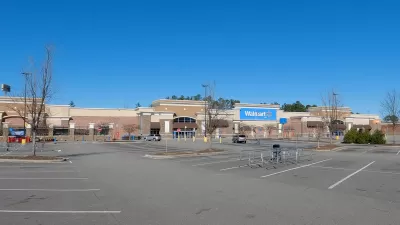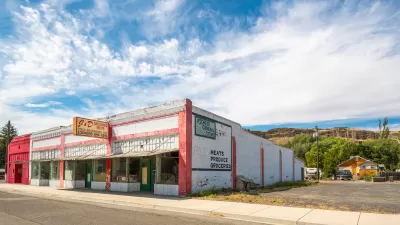For years, the sizes of grocery stores have grown increasingly to provide a greater variety to the consumer. Andrew Martin explains why retailers have now begun opening smaller stores instead.
"The idea is to lure time-starved shoppers who want to pick up a few items or a fast meal without wandering long grocery aisles or paying restaurant prices."
"The opening of smaller stores upends a long-running trend in the grocery business: building ever-larger stores in the belief that consumers want choice above all. While the largest traditional grocery stores tend to be about 85,000 square feet, some cavernous warehouse-style stores and supercenters are two or three times that size.
Statistics compiled by the Food Marketing Institute show that the average size of a grocery store dipped slightly in 2007 - to a median of 47,500 square feet - after 20 years of steady growth."
FULL STORY: Miles of Aisles for Milk? Not Here

Planetizen Federal Action Tracker
A weekly monitor of how Trump’s orders and actions are impacting planners and planning in America.

Maui's Vacation Rental Debate Turns Ugly
Verbal attacks, misinformation campaigns and fistfights plague a high-stakes debate to convert thousands of vacation rentals into long-term housing.

Restaurant Patios Were a Pandemic Win — Why Were They so Hard to Keep?
Social distancing requirements and changes in travel patterns prompted cities to pilot new uses for street and sidewalk space. Then it got complicated.

In California Battle of Housing vs. Environment, Housing Just Won
A new state law significantly limits the power of CEQA, an environmental review law that served as a powerful tool for blocking new development.

Boulder Eliminates Parking Minimums Citywide
Officials estimate the cost of building a single underground parking space at up to $100,000.

Orange County, Florida Adopts Largest US “Sprawl Repair” Code
The ‘Orange Code’ seeks to rectify decades of sprawl-inducing, car-oriented development.
Urban Design for Planners 1: Software Tools
This six-course series explores essential urban design concepts using open source software and equips planners with the tools they need to participate fully in the urban design process.
Planning for Universal Design
Learn the tools for implementing Universal Design in planning regulations.
Heyer Gruel & Associates PA
JM Goldson LLC
Custer County Colorado
City of Camden Redevelopment Agency
City of Astoria
Transportation Research & Education Center (TREC) at Portland State University
Jefferson Parish Government
Camden Redevelopment Agency
City of Claremont





























